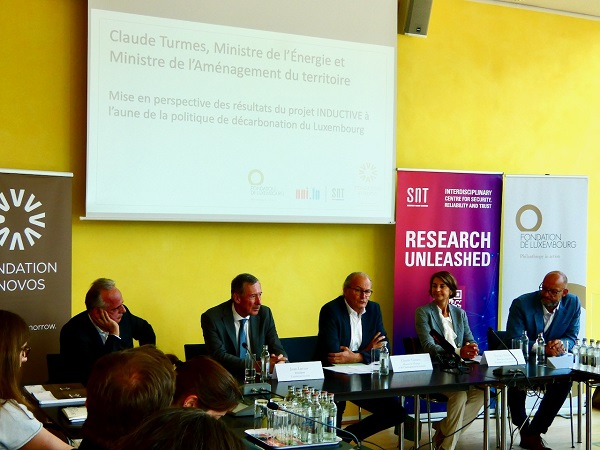 Enovos Foundation press conference presenting results of the INDUCTIVE research project of the University of Luxembourg's Interdisciplinary Centre for Security, Reliability and Trust (SnT) with Luxembourg Minister for Energy, Claude Turmes (centre);
Credit: Fondation de Luxembourg
Enovos Foundation press conference presenting results of the INDUCTIVE research project of the University of Luxembourg's Interdisciplinary Centre for Security, Reliability and Trust (SnT) with Luxembourg Minister for Energy, Claude Turmes (centre);
Credit: Fondation de Luxembourg
The Enovos Foundation, under the aegis of the Fondation de Luxembourg, recently presented the results of the INDUCTIVE research project of the Interdisciplinary Centre for Security, Reliability and Trust (SnT) of the University of Luxembourg, which launched in 2021.
The decarbonisation of mobility is a cornerstone of a sustainable energy transition. In this context, the Enovos Foundation, which supports this project, explained that it aims to exploit flexibility in the charging of electric cars in order to optimise demand, in particular by charging cars during periods of high supply (especially through the high availability of renewable energies) on the electricity markets.
According to the Enovos Foundation, if the Grand Duchy is going to reach the target of 49% of electric cars (EV) registered by 2030, the energy network will have to be able to meet this new demand, while relying on renewable energy sources, which are subject to a fluctuation that is not always predictable.
The INDUCTIVE project’s aim was to develop technological means that facilitate the optimisation of electric vehicle charging, while taking into account the needs of users, energy suppliers and network managers (e.g. to better manage energy consumption patterns during electric vehicle charging).
“While most drivers charge their electric car in the evening, some of them would agree to charge during the day or at night, or only charge the battery halfway. This flexibility could lighten the overall load of the electricity system and allow suppliers and grid operators to balance the electricity purchased,” explained Dr Maxime Cordy, researcher from the University of Luxembourg at SnT.
For two years, the INDUCTIVE project research team focused on three parameters that help to better understand the different scenarios that drivers and suppliers may face during a charging process: firstly, exploring the potentials of renewable energy optimisation of an energy provider that exploits the flexibility of coordinated electric vehicle charging, secondly, testing a system of benefits for drivers who are willing to adjust their charging windows according to supply and demand in the markets and thirdly, developing a pilot decision-making system that can schedule the charging time of the EV fleet and thereby optimising the benefits for suppliers, grid operators and drivers.
The results of the project have reportedly enabled a better understanding of consumer motivations as well as the charging schedule and possible flexibilities to better identify and react to the demand for electricity for charging. Among other things, the development of a decision simulation platform made it possible to simulate how users can configure their preferences and, depending on their data, how such a service could be integrated into a mobile interface.
Taken as a whole, the Enovos Foundation found that the project results provide possibilities for innovations in the energy market, in particular by contributing to decision-making mechanisms that facilitate the frequency and speed of EV charging. As Luxembourg Minister for Energy, Claude Turmes, pointed out, “Luxembourg is a world leader in electromobility. Combining and optimising the use of renewable energies in recharging electric cars, as the INDUCTIVE project did, is a real asset for accelerating the exit from fossil fuels. With the number of EVs in the national fleet on the rise, the project findings point to a future where EV charging is optimised and automated from the driver level, all the way to the supplier.”
The press conference to present the results took place on Wednesday 12 July 2023, in the presence of Minister Turmes, Erik von Scholz, CEO of Enovos Luxembourg SA, Jean Lucius, President of the Enovos Foundation, Dr Carlo Duprel , Head of Technology Transfer Office at SnT and Dr Maxime Cordy, Head of the INDUCTIVE project at SnT, as well as Tonika Hirdman, Managing Director of the Fondation de Luxembourg.








